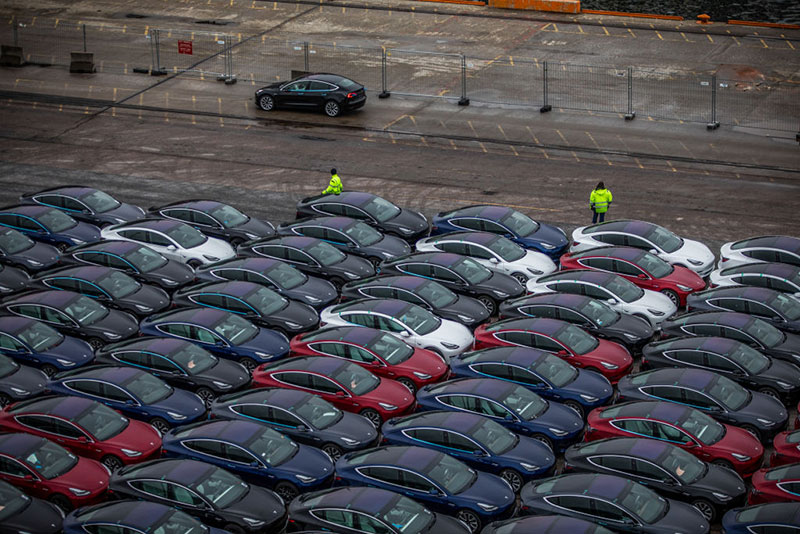電動(dòng)汽車革命在這個(gè)國(guó)家已經(jīng)全面展開(kāi)
|
在搬去挪威之前,,邁克爾·阿勒普從未擁有過(guò)汽車,。 不過(guò),,這位銀行家與家人在2016年從丹麥哥本哈根搬到挪威首都奧斯陸之后,覺(jué)得有必要買輛汽車,。于是,,他們做出了和如今的挪威人一樣的選擇,購(gòu)買了一輛特斯拉(Tesla)的Model-S,。 阿勒普表示,,這不是他最初的想法。他說(shuō):“我本來(lái)覺(jué)得(特斯拉)太貴了,,不過(guò)在挪威購(gòu)買電動(dòng)汽車有很多獎(jiǎng)勵(lì)機(jī)制,。”首先,,他在買車時(shí)不用交稅,。此外還能夠享受其他福利:不用繳納交通擁堵費(fèi)和養(yǎng)路費(fèi),還可以免費(fèi)停車,。 這些特權(quán)創(chuàng)造了電動(dòng)汽車的強(qiáng)大需求,,推動(dòng)著這個(gè)全球第八大原油出口國(guó)走向電動(dòng)汽車革命的前沿。 |
Until he moved to Norway, Michael Arup had never owned a car. But when the banker and his family moved from Copenhagen, Denmark to the Norwegian capital of Oslo in 2016, they decided a vehicle was a necessity. So they did as the Norwegians now do, and bought a Tesla Model-S. It hadn’t been his first idea, he says. “I had just assumed [a Tesla] would be too costly, but in Norway there are so many incentives to buy electric cars,” Arup says. First of all, he paid no tax when he bought the car. There were other benefits too: no congestion charges, no road tolls—and free parking. Those perks have created a powerful demand for electric cars, pushing the country—the world’s eighth-largest oil exporter—to the front of the electric car revolution. |

|
位于奧斯陸的一家能源咨詢公司Rystad的數(shù)據(jù)顯示,,今年上半年,,挪威電動(dòng)汽車的銷量占私人汽車總銷量的55%,較之2013年提高6%,。這種改變很大程度上是由于鼓勵(lì)挪威人采用電動(dòng)汽車的稅收減免和刺激政策的雙重強(qiáng)力推動(dòng)所致,。 柴油之死? 這些數(shù)據(jù)凸顯了過(guò)去六年里翻天覆地的變化,。Rystad表示,,在這一時(shí)期,柴油車的銷量減少了95%,,而柴油車的使用比例也下跌至32%,,幾乎只有2013年的一半。據(jù)該咨詢公司所說(shuō),,汽油車的比例也從29%下跌至17%,。 Rystad的高級(jí)分析師阿爾喬姆·特恩表示:“能夠支持高里程的電池電動(dòng)汽車減少了以SUV和轎車為主的高端柴油車的銷量,那些也是市場(chǎng)上消耗能源最多的私家車,?!?/p> 當(dāng)然,在挪威最受喜愛(ài)的電動(dòng)汽車品牌一直是特斯拉,。根據(jù)挪威統(tǒng)計(jì)機(jī)構(gòu)的數(shù)據(jù),,今年7月,這家電動(dòng)汽車廠商超過(guò)大眾(Volkswagen),,登上了人氣榜首位,。中型車Model 3則是該品牌銷量最好的車型。 阿勒普承認(rèn),,挪威的特斯拉也有缺點(diǎn)——他表示,,在冬天,特斯拉的里程數(shù)只有夏天的一半,。如果要去滑雪,,那么開(kāi)電動(dòng)車比開(kāi)燃油車需要更多準(zhǔn)備措施。 不過(guò)充電設(shè)施的普及也減少了這種憂慮,。 他表示:“今年夏天,,我們駕車環(huán)游了挪威西部,任何地方都能夠找到超級(jí)充電器,。在野營(yíng)營(yíng)地,,他們也提供超級(jí)充電器,還是免費(fèi)的,?!?/p> 原油出口國(guó)致力于綠色行動(dòng) 挪威農(nóng)村的超高速充電站,,與該國(guó)在經(jīng)濟(jì)上對(duì)原油和天然氣行業(yè)的持續(xù)依賴似乎有些不一致。 盡管——或者正因?yàn)椤@種依賴,,挪威政府也采取了一些積極措施讓消費(fèi)者放棄化石燃料,。在挪威的主權(quán)財(cái)富基金中剔除一些主要的能源公司,就是采納了該國(guó)中央銀行的建議,,因?yàn)樵搰?guó)太容易受到原油和天然氣行業(yè)的影響,。 |
In the first half of this year, electric vehicles made up 55% of personal vehicle sales in Norway, up from 6% in 2013, according to Rystad, an energy consultancy based in Oslo. That shift is largely due to a powerful mix of tax breaks and incentives to encourage Norwegians to go electric. The death of diesel? Those stats cap a dramatic transformation over the last six years. In the period, sales of diesel cars have dropped by 95%, the consultancy says, and the share of diesel vehicles in use has sunk to just 32%, almost half what it was in 2013. The share of gasoline-burning cars has dropped to 17%, down from 29%, according to Rystad. “High-range battery electric cars have reduced the sales of high-end diesel vehicles, primarily SUVs and sedans, which are also the most energy-consuming private vehicles on the market,” said Artyom Then, a senior analyst at Rystad. The nation’s favorite electric car brand has been, of course, Tesla. In July, the electric carmaker became the most popular in Norway, eclipsing Volkswagen, according to the Norwegian statistics agency. The mid-sized Model 3 was its most-sold vehicle. There are downsides to a Tesla in Norway, admits Arup—in the winter, the range is about half what it is in the summer, he says. Skiing trips require slightly more preparation than if he used a fuel-burning car. But the proliferation of charging infrastructure has also lessened those worries. “This summer, we drove around western Norway, and there were super chargers in the middle of nowhere,” he says. “In the camping site, they had a super-charger, free of charge.” An oil exporter pushes to go green Super-fast electric charging stations in rural Norway is an image that’s slightly at odds with the country’s continued economic dependence on its oil and gas industry. Despite—or because of—this dependency, Norway’s government has also made some aggressive steps to wean consumers from the fossil fuels. That includes aiming to end the sale of fossil-fuel burning cars by 2025, and divesting from some major energy companies within Norway’s sovereign wealth fund—a decision based on the country’s central bank’s advice that the country was too exposed to the oil and gas industry. |

|
Rystad表示,,由此導(dǎo)致的消費(fèi)者對(duì)電動(dòng)汽車的偏好,,不僅讓柴油車受到嚴(yán)重打擊,,還減弱了插電式混合動(dòng)力車的需求,。挪威人在選擇電動(dòng)車上傾向于徹底的電動(dòng)化。 阿勒普對(duì)此表示同意,。隨著電動(dòng)汽車在挪威普及開(kāi)來(lái),,一些稅收激勵(lì)政策的力度也有所減弱(例如,他如今需要支付一定的擁堵費(fèi)),,不過(guò)阿勒普表示,,目前享有的優(yōu)惠比起使用汽油汽車而言仍然更加劃算。 他表示,,在挪威,,“不買輛電動(dòng)汽車完全沒(méi)有道理?!保ㄘ?cái)富中文網(wǎng)) 譯者:嚴(yán)匡正 |
Consumers’ resulting shift to electric hasn’t just hit diesel hard, it’s weakened demand for plug-in hybrids too, says Rystad. When Norwegians go electric, they prefer to go all the way. Arup agrees. As electric cars have become ubiquitous in Norway, some of the tax incentives have been cut back (he now has to pay some congestion fees, for example), but Arup says the discounts he gets over fuel-burning cars still mean it's worth it. In Norway, he says, “it doesn’t make sense not to have an electric car.” |













